row2k Features
Rowing the Big Muddy
row2k Interview with Greg Spooner
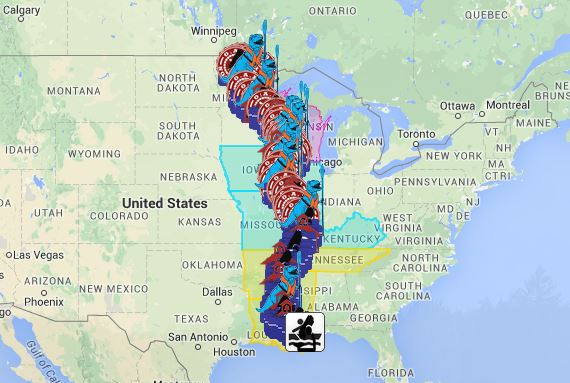
row2k Interview with Greg Spooner
January 5, 2015
Ed Hewitt, row2k.com
Ed Hewitt, row2k.com

The full route
Oar Northwest is technically "a Seattle-based not-for-profit adventure education organization" - but rowers might understand them better as a bunch of truly hardcore rowing people who try to find really good reasons to take really long rows. Past expeditions have included an Atlantic crossing attempt, a Salish Sea expedition, an Olympic Peninsula circumnavigation, and a record-setting victory in the 3,100 mile New York to England North Atlantic Rowing Race in 2006.
This past summer, the group convened rowers, scientists, and educators on a trip down the full length of the Mississippi River from its headwaters in Lake Itasco in Minnesota to the Gulf of Mexico, stopping frequently along the route to go into local classrooms to teach and do presentations, take water and soil samples, and more - of course including heaps of rowing.
The trip is intended to be the first in an annual "OAR Northwest Education series" in which the group will complete similar trips on which they hope to blend "real-life adventure with technology to reach students both locally and beyond." You can read more about the program and trips on the Oar Northwest site and at rowboatclassroom.org, a mini-site about the Missippi River expedition.
row2k spoke with Oar Northwest rower and founding member Greg Spooner about the inspiration for the trip, what they accomplished along the way, and the people they met along the Big Muddy.
Can you tell me about the inspiration for a trip down the Mississippi?
Adventure isn't adventure without the opportunity to share the story, share the experiences, share the encounters, share the lessons we learn along the way. Beyond whatever personal exploration or thirst for adventure people have at varying levels, the sharing and interactivity should always be your reason for adventuring. Now, when you tell somebody "I'm going to row across the ocean in a rowboat," there is so much that's foreign about that statement that people just don't get it. And right there you've lost a big portion of your audience.
When OAR Northwest pivoted our nonprofit organizational mission from going on expeditions and fundraising for charity toward a more long-term education and curriculum delivery strategy, finding something more relatable made the most sense... something coastal or inland, really, that people can almost visualize themselves taking part in.
And why the Mississippi?
Everybody knows the Mississippi River and has either seen it in person, or talked about it in a history or economics class, or benefited from its commerce or its hydrological engineering principals on their own local waterways. Our dear friend and lifelong Canadian paddler Max Finkelstein said it best, "to know America, you have to know the Mississippi River."
Did you spend much time thinking about the role of the river in the history and literature of the country (would not have to be limited to post-European discovery, as it is a very old river)?
Oh yeah, and that's the entire reason why we thought an education expedition in the United States absolutely had to be on the Mississippi River.
It seems like you had several things going on with the trip - education, data collection, experiments, and more; how did these all fit together?
Those pieces all seem to complement each other very well, and create a learning and sharing opportunity that also benefits our own thirst for knowledge while underway. Direct from the rowboat, we deliver high quality, standards-aligned STEM-focused curriculum designed by Adventure Learning experts. The education component is set against the adventure narrative backdrop to bring it all to life for students to be inspired to take part in their own backyard or classroom adventures and explorations.
The science component is us doing our part for Citizen Science. I don't think we're trying to set any example, per say, I think it's just really cool to run experiments and use fun gadgets because science rocks! We are a slow-moving platform with a lot of time and easy access to the water. You can't get higher resolution data and cheaper. Through partnerships with the University of Washington and Louisiana State University, we help scientists and researches learn more about ocean acidification, the growing hypoxic zone in the Gulf of Mexico, and how these significant environmental challenges are affecting local ecology, industry, and eventually the consumer. Plus, performing a water quality test with a student is just a load of fun!
Why row (I suppose instead of merely driving along the river, or cherry-picking spots along the way)?
We love rowing. Why not get the satisfaction of a full source-to-sea expedition? It's nothing close to the first time (or last) that folks have been descending the river, but you still get to feel proud of that accomplishment long after the journey is complete. You get to look at a map, look at a globe, see the meandering path of the Great River and say "I rowed that!"
Due to the need for advanced scheduling to accommodate a teacher's classroom schedule, there were a couple of brutal stretches of back-to-back-to-back 60mi days with low flow/current that has us considering either adding days to the schedule for next year's crew, or just removing a portion of the river's headwaters and starting in Minneapolis to reduce overall fatigue as the expedition enters its final few weeks in Mississippi and Louisiana.
What about the rowing itself - was it harder than expected? Easier? Did you have any experiences that would resonate with hardcore rowing folks as familiar, or perhaps even better totally unfamiliar?
Certainly more challenging than I anticipated. Matter of fact I thought rowing down the Mississippi River was WAY more grueling than rowing across the Atlantic Ocean... I know the other guys may feel differently, though. At least on the Atlantic you have forced naps every couple hours, for goodness sakes!
Picture going on a walk while listening to your favorite podcast. Tune out and walk wistfully while enjoying the show and the scenery, then emerge on a street corner and think, "Uh oh... where's my house? Oh yeah, it's 15 miles back up that arterial!" What a trip it was to finish the day and look at a map and imagining all that riverfront flying by, then truly realizing just how many miles you covered. Incredible some days! (Frustrating, others...)
What about the impressions of people you met along the way about rowing as an activity or sport?
Rowboats seemed so foreign to many folks along the river. Understandable though, really, because canoes are so much more prevalent. Many community members we'd spoken with talked about meeting others who had made a similar journey, but it was rare to find people who talked about wanting to venture on the river in a boat, much less go near it. The river has a sort of evil personality all its own that's been passed down through the generations since the early day floods like the Great Flood of 1927. "You boys are crazy. I've heard those whirlpools will suck a boat right under."
Monitoring VHF to hear the river barge pilots on the lookout for our fleet was hilarious. "Yeah, uhhh, Miss Suzanne this is the Karl Eckstein... just a heads-up you've got a couple of... what are those things, canoes? Kayaks? Hell I don't know... Johnboats with paddle-thingies southbound just upriver from ya." Typical of just about the entire river until we actually go into and below Baton Rouge where folks on the whole seemed to really know boats like ours.
According to the Mississippi River Paddlers Facebook group, more people descended the river in human-powered craft this year than ever before. To me that's great news, and something that more people should boast about because it's a grand accomplishment. And provided you learn or teach yourself some fundamentals of boating safety, the more people we can have on the water having fun and interacting with it, the more likely others will want to engage in a happy, fun and healthy way to live life.
What surprises did you encounter along the way?
History books came to life. From Lewis & Clark, to Abraham Lincoln, to the Civil War, to Mark Twain, to early glacial advance and the "driftless," to Hurricane Katrina.
Were there any especially memorable local people you met?
Every single student. Those kids are beaming with excitement for the life of wonder that lies ahead. It's inspiring for each of us.
This past summer, the group convened rowers, scientists, and educators on a trip down the full length of the Mississippi River from its headwaters in Lake Itasco in Minnesota to the Gulf of Mexico, stopping frequently along the route to go into local classrooms to teach and do presentations, take water and soil samples, and more - of course including heaps of rowing.
The trip is intended to be the first in an annual "OAR Northwest Education series" in which the group will complete similar trips on which they hope to blend "real-life adventure with technology to reach students both locally and beyond." You can read more about the program and trips on the Oar Northwest site and at rowboatclassroom.org, a mini-site about the Missippi River expedition.
row2k spoke with Oar Northwest rower and founding member Greg Spooner about the inspiration for the trip, what they accomplished along the way, and the people they met along the Big Muddy.
Can you tell me about the inspiration for a trip down the Mississippi?
Adventure isn't adventure without the opportunity to share the story, share the experiences, share the encounters, share the lessons we learn along the way. Beyond whatever personal exploration or thirst for adventure people have at varying levels, the sharing and interactivity should always be your reason for adventuring. Now, when you tell somebody "I'm going to row across the ocean in a rowboat," there is so much that's foreign about that statement that people just don't get it. And right there you've lost a big portion of your audience.
When OAR Northwest pivoted our nonprofit organizational mission from going on expeditions and fundraising for charity toward a more long-term education and curriculum delivery strategy, finding something more relatable made the most sense... something coastal or inland, really, that people can almost visualize themselves taking part in.
And why the Mississippi?
Everybody knows the Mississippi River and has either seen it in person, or talked about it in a history or economics class, or benefited from its commerce or its hydrological engineering principals on their own local waterways. Our dear friend and lifelong Canadian paddler Max Finkelstein said it best, "to know America, you have to know the Mississippi River."
Did you spend much time thinking about the role of the river in the history and literature of the country (would not have to be limited to post-European discovery, as it is a very old river)?
Oh yeah, and that's the entire reason why we thought an education expedition in the United States absolutely had to be on the Mississippi River.
It seems like you had several things going on with the trip - education, data collection, experiments, and more; how did these all fit together?
Those pieces all seem to complement each other very well, and create a learning and sharing opportunity that also benefits our own thirst for knowledge while underway. Direct from the rowboat, we deliver high quality, standards-aligned STEM-focused curriculum designed by Adventure Learning experts. The education component is set against the adventure narrative backdrop to bring it all to life for students to be inspired to take part in their own backyard or classroom adventures and explorations.
The science component is us doing our part for Citizen Science. I don't think we're trying to set any example, per say, I think it's just really cool to run experiments and use fun gadgets because science rocks! We are a slow-moving platform with a lot of time and easy access to the water. You can't get higher resolution data and cheaper. Through partnerships with the University of Washington and Louisiana State University, we help scientists and researches learn more about ocean acidification, the growing hypoxic zone in the Gulf of Mexico, and how these significant environmental challenges are affecting local ecology, industry, and eventually the consumer. Plus, performing a water quality test with a student is just a load of fun!
Why row (I suppose instead of merely driving along the river, or cherry-picking spots along the way)?
We love rowing. Why not get the satisfaction of a full source-to-sea expedition? It's nothing close to the first time (or last) that folks have been descending the river, but you still get to feel proud of that accomplishment long after the journey is complete. You get to look at a map, look at a globe, see the meandering path of the Great River and say "I rowed that!"
Due to the need for advanced scheduling to accommodate a teacher's classroom schedule, there were a couple of brutal stretches of back-to-back-to-back 60mi days with low flow/current that has us considering either adding days to the schedule for next year's crew, or just removing a portion of the river's headwaters and starting in Minneapolis to reduce overall fatigue as the expedition enters its final few weeks in Mississippi and Louisiana.
What about the rowing itself - was it harder than expected? Easier? Did you have any experiences that would resonate with hardcore rowing folks as familiar, or perhaps even better totally unfamiliar?
Certainly more challenging than I anticipated. Matter of fact I thought rowing down the Mississippi River was WAY more grueling than rowing across the Atlantic Ocean... I know the other guys may feel differently, though. At least on the Atlantic you have forced naps every couple hours, for goodness sakes!
Picture going on a walk while listening to your favorite podcast. Tune out and walk wistfully while enjoying the show and the scenery, then emerge on a street corner and think, "Uh oh... where's my house? Oh yeah, it's 15 miles back up that arterial!" What a trip it was to finish the day and look at a map and imagining all that riverfront flying by, then truly realizing just how many miles you covered. Incredible some days! (Frustrating, others...)
What about the impressions of people you met along the way about rowing as an activity or sport?
Rowboats seemed so foreign to many folks along the river. Understandable though, really, because canoes are so much more prevalent. Many community members we'd spoken with talked about meeting others who had made a similar journey, but it was rare to find people who talked about wanting to venture on the river in a boat, much less go near it. The river has a sort of evil personality all its own that's been passed down through the generations since the early day floods like the Great Flood of 1927. "You boys are crazy. I've heard those whirlpools will suck a boat right under."
Monitoring VHF to hear the river barge pilots on the lookout for our fleet was hilarious. "Yeah, uhhh, Miss Suzanne this is the Karl Eckstein... just a heads-up you've got a couple of... what are those things, canoes? Kayaks? Hell I don't know... Johnboats with paddle-thingies southbound just upriver from ya." Typical of just about the entire river until we actually go into and below Baton Rouge where folks on the whole seemed to really know boats like ours.
According to the Mississippi River Paddlers Facebook group, more people descended the river in human-powered craft this year than ever before. To me that's great news, and something that more people should boast about because it's a grand accomplishment. And provided you learn or teach yourself some fundamentals of boating safety, the more people we can have on the water having fun and interacting with it, the more likely others will want to engage in a happy, fun and healthy way to live life.
What surprises did you encounter along the way?
History books came to life. From Lewis & Clark, to Abraham Lincoln, to the Civil War, to Mark Twain, to early glacial advance and the "driftless," to Hurricane Katrina.
Were there any especially memorable local people you met?
Every single student. Those kids are beaming with excitement for the life of wonder that lies ahead. It's inspiring for each of us.
SUPPORT ROW2K
If you enjoy and rely on row2k, we need your help to be able to keep doing all this. Though row2k sometimes looks like a big, outside-funded operation, it mainly runs on enthusiasm and grit. Help us keep it coming, thank you! Learn more.
If you enjoy and rely on row2k, we need your help to be able to keep doing all this. Though row2k sometimes looks like a big, outside-funded operation, it mainly runs on enthusiasm and grit. Help us keep it coming, thank you! Learn more.
Comments | Log in to comment |
Rowing Features
This Week's Best of Rowing on Instagram 4/27/2024
April 27, 2024
In the Driver's Seat, with Olivia Seline
April 23, 2024
This Week's Best of Rowing on Instagram 4/20/2024
April 20, 2024
Rowing Headlines
2024 Inaugural CRCA Athletes to Watch
March 13, 2024
World Rowing suspends Serbian Rowing Federation over financial debts
January 23, 2024
National Rowing Hall of Fame ® Class of 2023 Announced
October 5, 2023
Advertiser Index
- Bont Rowing
- Calm Waters Rowing
- Concept 2
- Craftsbury Sculling
- The Crew Classic
- CrewLAB
- Croker
- Dad Vail Regatta
- Durham Boat Co.
- Empacher
- Faster Masters
- Filippi
- Fluidesign
- h2row.net
- HUDSON
- Live2Row Studios
- Nielsen-Kellerman
- Oak Ridge RA
- Peinert Boat Works
- Pocock Racing Shells
- Race1 USA
- Rockland Rowing Masters Regatta
- RowKraft
- Rubini Jewelers
- Vespoli USA
- WinTech Racing
Get Social with row2k!
Get our Newsletter!
Enter your email address to receive our weekly newsletter.
Support row2k!
Advertiser Index
- Bont Rowing
- Calm Waters Rowing
- Concept 2
- Craftsbury Sculling
- The Crew Classic
- CrewLAB
- Croker
- Dad Vail Regatta
- Durham Boat Co.
- Empacher
- Faster Masters
- Filippi
- Fluidesign
- h2row.net
- HUDSON
- Live2Row Studios
- Nielsen-Kellerman
- Oak Ridge RA
- Peinert Boat Works
- Pocock Racing Shells
- Race1 USA
- Rockland Rowing Masters Regatta
- RowKraft
- Rubini Jewelers
- Vespoli USA
- WinTech Racing



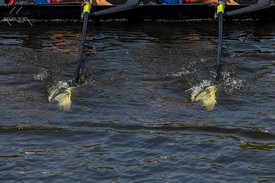
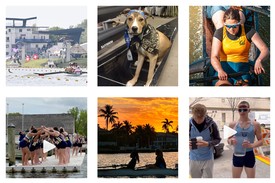
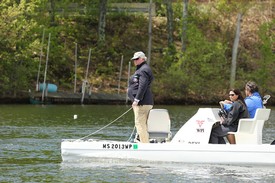
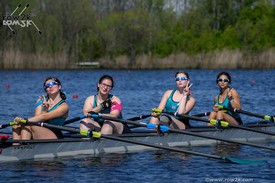
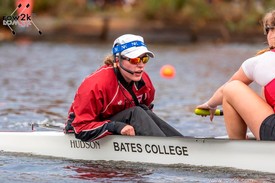









01/05/2015 11:07:29 AM